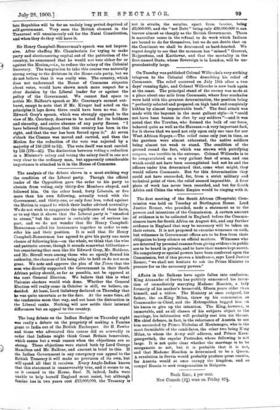Sir Henry Campbell-Bannerman's speech was not impres- sive. After chaffing
Mr. Chamberlain for trying to make party and electioneering capital out of the patriotism of the country, he announced that he would not vote either for or against the Motion,—i.e., to reduce the salary of the Colonial Secretary. The temptation to take this course was naturally strong owing to the divisions in the Home-rule party, but we do not believe that it was really wise. The country, which does not understand the House of Commons etiquette about votes, would have shown much more respect for a clear decision by the Liberal leader for or against the policy of the Government. We cannot find space to notice Mr. Balfour's speech or Mr. Courtney's earnest out- burst, except to note that if Mr. Kruger had acted on the principles it lays down there could have been no war. Sir Edward Grey's speech, which was strongly opposed to the view of Mr. Courtney, deserves to be noted for its boldness and sincerity, and entire absence of any party finesse. "I have believed throughout that this country has been in the right, and that the war has been forced upon it." At seven o'clock the Closure was moved and carried, and then the Motion for the reduction of the vote was rejected by a majority of 156 (208 to 52). The vote itself was next carried by 135 (176-41). The distinction between voting a reduction in a Minister's salary and voting the salary itself is one not very clear to the ordinary man, but apparently considerable importance is attached to it in the House of Commons.


































 Previous page
Previous page